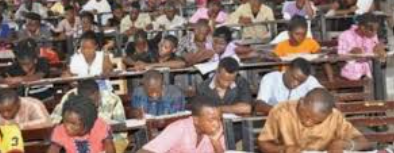Students and parents of the Nigeria Air Force Secondary School (NAFSS), Ikeja, have been thrown into uncertainty following reports that the West African Examinations Council (WAEC) has introduced new compulsory subjects for the 2026 West African Senior School Certificate Examination (WASSCE).
The sudden announcement reportedly conflicts with the Federal Ministry of Education’s reform schedule, leaving many students and teachers in shock as they prepare for exams less than six months away.
Contents
- WAEC’s Sudden Directive Sparks Concern
- Parents and Students Express Panic
- Ministry of Education’s Earlier Plan
- Conflict Between WAEC and Ministry Plans
- New Curriculum Highlights
- Students’ Readiness in Question
- WAEC’s Silence Fuels Speculation
- Parents Fear for Children’s Academic Future
- Possible Miscommunication?
- WAEC’s Mock CBT Examination Update
- Experts Call for Official Clarification
- The Bigger Picture: Nigeria’s Education Reform
- Teachers Seek Guidance
- Possible Outcomes if WAEC Confirms Change
- The Need for Transparency
- Conclusion
- FAQs
WAEC’s Sudden Directive Sparks Concern
According to a circular issued by the management of the Nigeria Air Force Secondary School, Ikeja, WAEC approved new subject offerings for the upcoming examination cycle.
The notice, which surfaced on social media over the weekend, claimed that these new subjects would take effect immediately for students sitting for the 2026 WASSCE, rather than being introduced gradually under the new curriculum plan.
Parents and students expressed confusion, noting that many SS3 candidates have not been taught the new compulsory subjects that now appear to be part of the upcoming examination.
Parents and Students Express Panic
For many parents, the sudden change feels like a shockwave through an already tense academic environment.
“We are worried because our children are in SS3. They’ve already chosen their subjects, and now we’re hearing there are new ones that are compulsory,” one concerned parent told Legit.ng.
Students also voiced anxiety, stating that they have had no prior preparation for the additional subjects. Some fear this may affect their performance and admission prospects in 2026.
Ministry of Education’s Earlier Plan
Under the Federal Ministry of Education’s revised national curriculum, the new subject framework was meant to begin with new students entering Primary 1, Primary 4, JSS1, and SS1 in the 2025/2026 academic session.
The reform aimed to:
- Reduce subject overload in schools.
- Introduce digital literacy and entrepreneurship education.
- Reinstate History as a standalone subject.
In other words, students already in SS2 or SS3 were supposed to continue under the old syllabus until they graduated.
However, WAEC’s recent directive appears to override this transition plan, suggesting that current SS3 students could be affected immediately — a move many see as premature and unfair.
Conflict Between WAEC and Ministry Plans
Education analysts have pointed out a clear policy contradiction between WAEC’s circular and the Ministry’s phased implementation strategy.
While the Ministry’s curriculum rollout was meant to allow time for teacher retraining and syllabus alignment, WAEC’s decision appears rushed, leaving schools struggling to adjust.
Dr. Mary Oladipo, an education consultant, explained:
“It’s like changing the rules in the middle of the game. You cannot introduce new subjects just months before an exam cycle. It disrupts preparation and increases failure risks.”
New Curriculum Highlights
The revised Nigerian curriculum introduces several modern subjects intended to meet 21st-century educational needs. Some of these include:
- Digital Literacy and Coding
- Entrepreneurship and Innovation Studies
- Civic Responsibility and Leadership
- Financial Literacy
- Environmental and Sustainable Development
While these subjects are welcome additions, their implementation timeline remains controversial — particularly if enforced without prior notice or training.
Students’ Readiness in Question
Teachers at the Nigeria Air Force Secondary School reportedly expressed concern that students are not ready to sit for exams based on the new curriculum.
“We haven’t been briefed officially by WAEC. We still teach the existing syllabus. It’s confusing,” said one teacher who requested anonymity.
The uncertainty has created what some describe as academic chaos, especially for SS3 students who are only months away from their final examinations.
WAEC’s Silence Fuels Speculation
When contacted for clarification, WAEC spokesperson Moyosola Adesina reportedly did not respond to calls or messages from journalists.
Similarly, Folashade Boriowo, Director of Press at the Federal Ministry of Education, stated that only WAEC could confirm the authenticity of the new directive.
This lack of communication has fueled speculation and fear, with many schools unsure whether to continue teaching the old syllabus or switch to the new one.
Parents Fear for Children’s Academic Future
Parents have expressed fear that their children may be disadvantaged if the new subjects are enforced suddenly.
Some guardians are also worried that this could lead to mass failure or confusion during university admissions, especially if other schools do not implement the same change simultaneously.
“How do you expect students to study new subjects in six months? It’s simply unrealistic,” another parent lamented.
Possible Miscommunication?
Some education observers believe the development at NAFSS Ikeja may stem from a local miscommunication rather than a nationwide policy shift.
The circular reportedly referenced “WAEC approval,” but without official confirmation from the council, analysts suggest it might reflect school-level misunderstanding of the coming curriculum changes.
Until WAEC issues a national directive, experts warn that schools should exercise caution before altering their syllabus or exam preparation plans.
WAEC’s Mock CBT Examination Update
In a related update, WAEC announced that it will conduct a mock Computer-Based Test (CBT) for private candidates ahead of the 2025 WASSCE Second Series.
The mock exam, scheduled for Wednesday, October 29, 2025, aims to familiarize candidates with the new digital exam system being gradually introduced.
Candidates have been instructed to visit mockcbt.waec.org.ng and log in using their examination numbers to participate.
This development suggests WAEC’s ongoing effort to modernize its examination process, even as uncertainty grows around the subject changes for 2026.
Experts Call for Official Clarification
Education experts and parents’ associations have urged WAEC and the Ministry of Education to issue a joint clarification statement.
They emphasize that clear communication is vital to prevent panic and misinformation across Nigeria’s secondary schools.
“It’s not just about one school in Lagos. Once this news spreads, every SS3 student in the country will be anxious,” noted Professor Adamu Bello, an education policy analyst.
The Bigger Picture: Nigeria’s Education Reform
Nigeria’s current education reform is part of a broader national strategy to align school learning with global digital and entrepreneurial trends.
The reintroduction of History, the inclusion of digital skills, and a shift towards competency-based learning are seen as positive steps toward producing globally competitive graduates.
However, analysts insist that these goals can only succeed if policy execution is coordinated between WAEC, NECO, the Ministry of Education, and private school associations.
Teachers Seek Guidance
Teachers across Lagos and other states are reportedly calling for urgent training and curriculum workshops.
Without such interventions, they warn that both teaching quality and exam outcomes could deteriorate.
“We need teacher support materials, marking guides, and textbooks aligned with the new curriculum,” said a principal from a public secondary school in Ogun State.
Possible Outcomes if WAEC Confirms Change
If WAEC confirms the new subjects for the 2026 WASSCE, the following implications are expected:
- Emergency Curriculum Adjustment: Schools will rush to include the new subjects.
- Increased Pressure on SS3 Students: Students may struggle to balance old and new requirements.
- Teacher Training Urgency: Rapid workshops will be required to cover new subjects.
- Exam Performance Risks: Lack of preparation may lead to lower pass rates.
- Policy Review by Ministry: The Education Ministry may intervene to prevent systemic disruption.
The Need for Transparency
Transparency remains a key concern in Nigeria’s education management. Stakeholders say frequent last-minute changes in exam policies undermine trust and stability.
If WAEC intends to reform the examination structure, experts insist that adequate time and public communication should be provided to ensure smooth implementation.
Conclusion
The reported introduction of new subjects for the 2026 WASSCE by WAEC has left many students, teachers, and parents confused and anxious.
Until WAEC issues a clear, nationwide directive, the current situation at the Nigeria Air Force Secondary School, Ikeja, stands as a warning sign of how sudden policy shifts can destabilize academic calendars.
Nigeria’s education reform goals remain commendable — but without careful coordination and transparent communication, they risk causing more panic than progress.
FAQs
1. What new subjects is WAEC introducing for 2026 WASSCE?
WAEC has not officially released a list, but reports suggest the inclusion of digital literacy, entrepreneurship, and leadership studies.
2. When will the new national curriculum officially begin?
According to the Ministry of Education, it will start in the 2025/2026 academic session for new students entering Primary 1, 4, JSS1, and SS1.
3. Will current SS3 students be affected?
This remains uncertain. WAEC has yet to confirm whether the directive applies nationwide.
4. What should schools do now?
Schools are advised to await official confirmation from WAEC before making major curriculum adjustments.
5. What is the purpose of WAEC’s mock CBT exam?
The mock CBT is designed to help private candidates practice and adapt to the new computer-based exam system before the actual test



